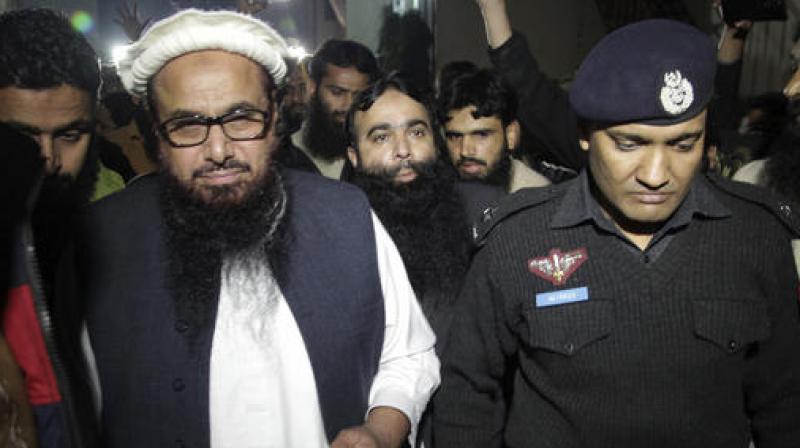Hafiz Saeed enjoying de-facto 'kingly status' in Pak: Baloch activist tells UN

Brussels: Asserting that Pakistan is terrorizing indigenous people and giving full impunity to terrorists, Gilgit-Baltistan activist Abdul Hamid Khan has conveyed to the United Nations that Jamaatud Dawa (JuD) chief and 26/11 Mumbai terror attack mastermind Hafiz Muhammad Saeed is a "highly respected" terrorist in Islamabad, who has been awarded a de-facto status like that of a king by being kept under tight security, so that nobody would be able to get their hands on him.
In a letter addressed to UN Secretary General Antonio Guterres, Khan highlighted that there are thousands of terrorist individuals and more than a dozen terrorist organizations active within different Madrasas, religious and political parties who are enjoying full impunity under Pakistan government institutions.
"Political activists and religious persons and students of Pakistan occupied Gilgit Baltistan (PoGB) who do not comply with ISI's dictation have been framed under anti-Terrorist act of Schedule 4. But the real terrorists who bomb and kill innocent civilians in Shrines, Mosques, Roadways and other places are free to roam. It's no secret that Hafiz Saeed, the head of Lashkar-e-Toiba who has been banned by the UN, is a highly respected terrorist in Pakistan," Khan said.
Noting that Pakistan wants to create fear among the indigenous people of Gilgit Baltistan, the Baloch activist further said that those who violate Pakistani orders by demanding something peacefully are declared as terrorists, adding that there is no provision to file an appeal as there is no Constitutional or Judicial system in the disputed region.
"BNF (Balawaristan National Front) has been banned and our books and booklets and newspapers have been banned, while religious hatred and anti-Gilgit Baltistan propaganda is fully supported by Pakistani occupation regime. The lives, property and freedom of the people is under serious threat due to Pakistan and China's joint conspiracy to strengthen their occupation under the garb of CPEC (China Pakistan Economic Corridor)," Khan further wrote in his letter.
Stating that under the Truce Terms of UNCIP resolution, Pakistan has no right to remain in the disputed land, the Baloch leader informed that after a lapse of 68 years of non-complying, Pakistan has virtually changed the whole 72000 Sq KM area of the disputed region in to "Military Torture Camp".
"Pakistani political and religious parties are fully sponsored by its Military power to practice on their will, but indigenous nationalist political parties voices are chocked by declaring them as terrorists, anti-national and traitors etc, who dare to oppose CPEC and Pakistani occupation, which is flagrant violation of not only UNCIP resolutions but it ridicules Universal Declaration of Human Rights and even violates Pakistan's own constitution and Court verdicts," Khan said.
Earlier, Baloch political and human rights activists demanded a special rapporteur in the United Nations to probe gross human rights violations in Pakistan's Balochistan province.
Baloch activist Ahmar Mastikhan stressed that Balochistan is a graver crisis than Rohingya Muslims in Myanmar.
"It has been delayed. It could have happened a long time ago and we have a situation of mass graves where there is no domestic redressed available to the people of Balochistan. Has there been some domestic mechanism for them to have their basic and birth human rights protected, we would not have raised this question. We are happy over the Rohingya r rapporteur in Burma, but I assure you, it is more serious issue than Rohingya issue. It is more multi- dimensional and multi-faceted," Mastikhan said.
Meanwhile, in what comes as a matter of concern for India, Pakistan is planning to declare Gilgit-Baltistan region as its fifth province.
The Gilgit-Baltistan area is Pakistan's northernmost administrative territory that borders the disputed Pakistan-occupied Kashmir.
A committee headed by Adviser to Prime Minister on Foreign Affairs Sartaj Aziz recommended granting the region a provincial status.
Balochistan, Khyber Pakhtunkhwa, Punjab, and Sindh are four provinces of Pakistan, however, India claims the Gilgit-Baltistan area as an integral part of its territory.

